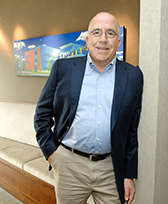Subscriber Benefit
As a subscriber you can listen to articles at work, in the car, or while you work out. Subscribe NowHonoree, Private Companies (revenue over $100 million)
Ask the CFO, secretary and treasurer of F.A. Wilhelm Construction Co. about his biggest challenges and achievements of 2012, and you get a laundry list of issues: everything from developing a new generation of in-house leaders to fighting rising health care costs to monitoring the financial health of the firm’s subcontractors and suppliers. That’s what’s involved if you want to run a lean, mean company. And in Cathcart’s line of work, the only alternative to being “lean and mean” is being “run out of business.”
“The construction industry has been an extremely difficult one for the last few years, with several companies failing,” said Wilhelm CEO Phil Kenney. “This has made me realize how vital Joe has been in managing our relationships with banks, sureties, and insurance companies. Our company is 89 years old and not one day goes by that Joe takes this for granted. He knows that every decision he makes will affect lives and the future of our company.”
 (IBJ Photo/ Perry Reichanadter)
(IBJ Photo/ Perry Reichanadter)Age: 50
Family: wife Kim; daughter Kali, 26; son
David, 25; son Ryan, 22; daughter Taylor,
22; daughter Kelly, 21; daughter Allie, 19
Hometown: Brookfield, Wis.
Education: bachelor’s degree in business management from the University
of Indianapolis; CPA
Civic Involvement: Wilhelm Actively
Contributing Through Service (ACTS);
Catholic Youth Organization; Scecina
Memorial High School; Big Brothers/
Big Sisters
Hobbies: Family time, reading, exercising,
sports and golf
There have been a lot of those decisions over the last few years. Wilhelm, an Indianapolis-based construction manager, general contractor and design/builder found itself in a tough spot during the recession. That’s when Cathcart, who describes the industry, even in good times, as a “high-risk, labor-intensive business with little or no margin for error,” stepped in to help trim the sails.
“We have a long history of running a lean, nimble organization,” Cathcart said. “We were very proactive in making changes early on in the downturn. We were disciplined, selective in identifying opportunities and careful not to bid work too low.”
The firm shared the pain with employees by bringing them together for a no-holds-barred examination of where the company stood and what was required to make things better.
“It’s still a challenging economic environment, but there appear to be signals of an upswing,” said Cathcart. “There’s a lot of cash on the sidelines, ready to be invested.”
When that money finally decides to get in the game, Cathcart wants to make sure he has the staff in place to grab Wilhelm’s fair share.
“A lot of people left our industry ‘for good’ during the economic downturn,” Cathcart said. “The last two years our volumes have increased and we continue to see more and more opportunities. This growth and the opportunities put pressure on us to continue the development of our staff and to recruit and hire talented people.”
Considering the problems of the last few years, that’s a nice conundrum to have.•
___
Please enable JavaScript to view this content.
